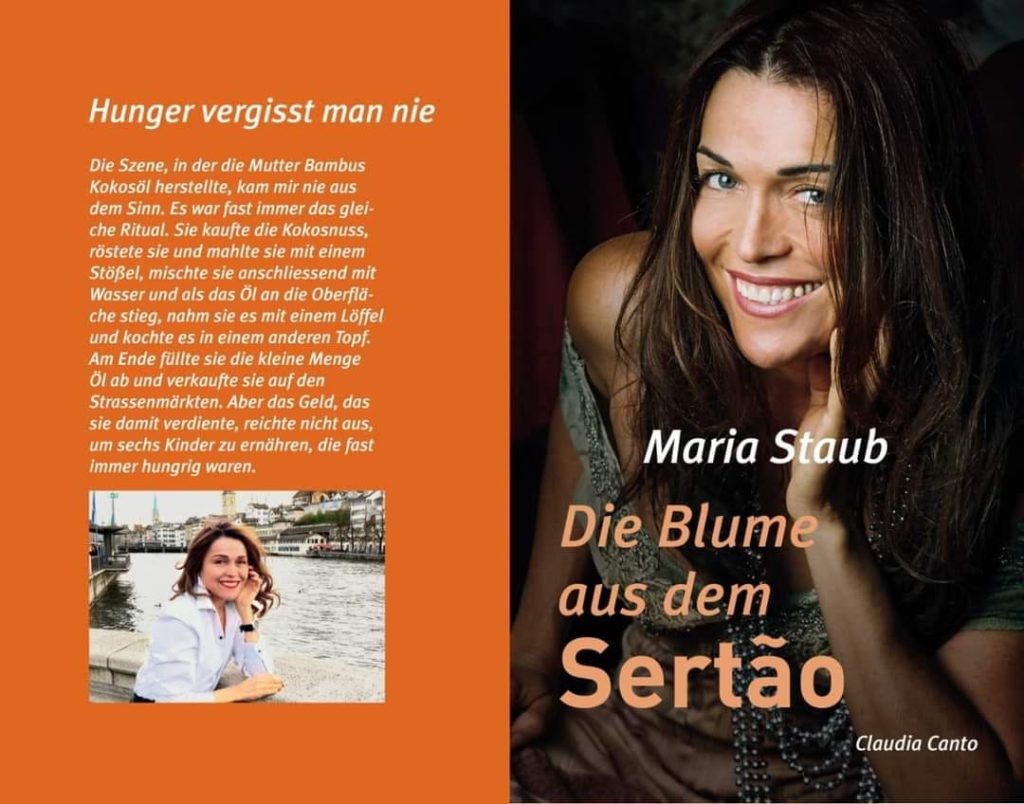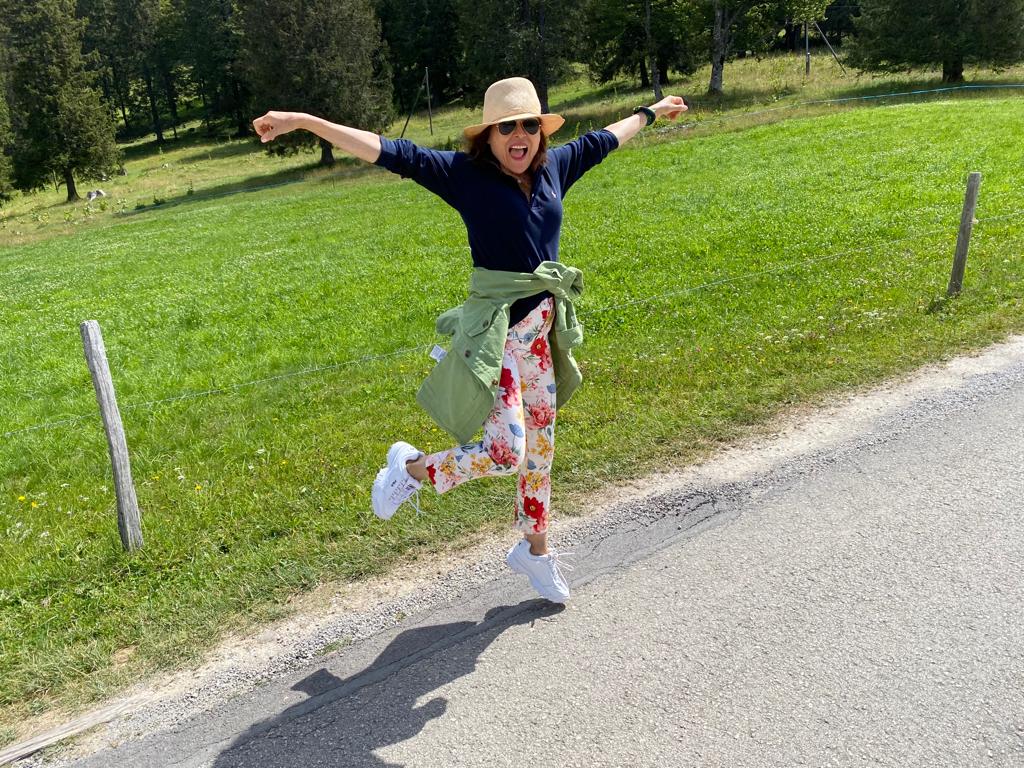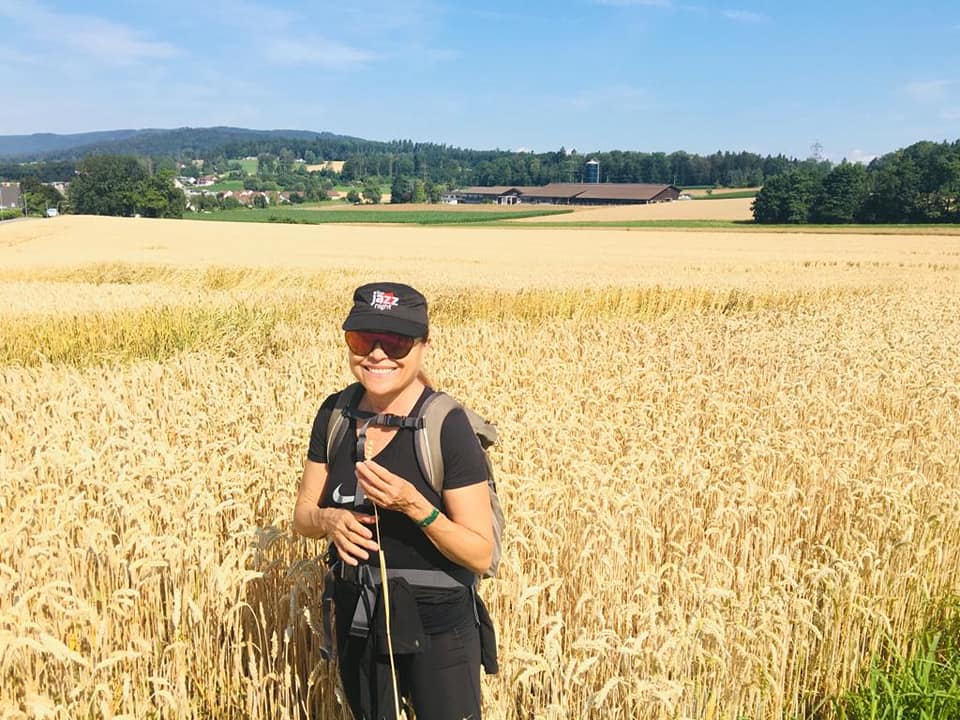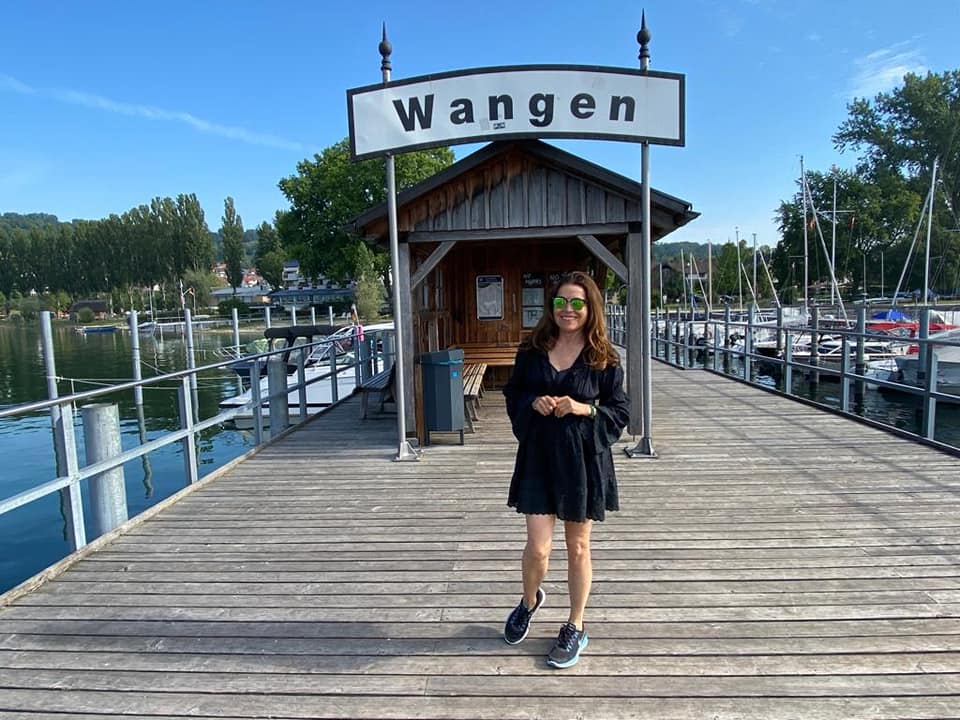At the age of 60, the Brazilian Maria Staub, who has lived in Switzerland for 26 years, feels whole. But the road to reach this state of mind was long. In her book, “Flor do Sertão” she says how she went through a difficult childhood, overcoming an intense depression and 22 years of therapy. Today she has revealed to us the secret of her success.
by Juliana da Penha
Maria Staub Gonçalves da Costa Gomes is the mother of Daniela and Markus.
Born in Altos, a town in the hinterland of Piaui, northeast Brazil, she currently lives in Zurich, Switzerland.
Maria first arrived in Switzerland in 1990 with 29 years old, accompanying her ex-husband, who is a Swiss citizen. After three months in the country, she became pregnant. She still didn’t speak the language, had no friends and some other factors harmed Maria’s life.
Because of severe depression, she returned to Brazil in 1994. It was then that she began her healing process, and psychoanalysis was a tool that greatly helped her. In 2001 she returned to Switzerland determined to transform her life, starting with self-care. And this process continues today, day after day. One of the most significant discoveries was the importance of spirituality. But not a spirituality dictated by religion, but by a search for knowledge. Another discovery, with the help of the writer Claudia Canto, was literature as a therapeutic tool. In this interview, she explains a little of her inspiring trajectory.

Interview with Maria Staub
What are the positive and negative aspects of life in Switzerland? What is life like for a Brazilian woman in Switzerland?
Maria: The positive side is that we are forced to grow spiritually. Life is so hard, and we get so much that you grow up. So that’s a positive thing, you grow, and you become someone else, even if it’s with imposition. The negative is that we are very discriminated against, Brazilian woman is seen as someone with bad character, as a prostitute, who only wants money. The other women see me as a competitor.
How do you keep your Brazilian roots in a place that is so different from Brazil? Have you found any similarity between Switzerland and Brazil? What has this new culture changed in you?
Maria: It has nothing to do with it. Zero resemblance. I will say 1% maybe because of religion, they are Christians here and so is Brazil. I think this is the only similarity. Swiss people are very cold. It’s not that they’re bad people, they’re reserved, and to enter into their circle of friendships is very difficult.
This whole environment changes anyone who lives here. My mother used to say, “In the land of the frog squatting with him” (laughs).
Loneliness made me keep my roots. The loneliness is so deep that we are forced to call our family.
“São Paulo is like a foreign land for the Northeast people”.
You speak in your book of a challenging moment that was depression. Do you think that your migration experience influenced this problem? Today how do you see this difficult moment that you went through?
Maria: It had a bit to do with me, but I was already a firecracker ready to explode. With a terrible childhood, I had in Piaui, my adolescence in São Paulo. I never worked my psychic side to find myself; I also had no conditions and was not aware of it. I was already a bomb, full of problems, ready to explode. Then I arrived here in Switzerland; a country closed to foreigners, nobody invites anyone for anything. It’s not like in Brazil, people invite you for a barbecue, with music; here they are very reserved. So I had no friendships. And I was a complicated person, that person who sees problems in everything. I always put issues in people, so I isolated myself with my tongue. I was a person who was not spiritual; today, I recognize that the problem I experienced here was because I was not a spiritually evolved person. I found issues in everything; I was a complicated person.
We see the world as we are. I was sick; I saw the world sick, full of defects. Now that I am well, I see the beautiful world. I’m fine, the world is fine, Switzerland is gorgeous. (laughs).

“We see the world as we are. I was sick, I saw the world sick, full of defects. Now that I’m well I see the beautiful world. I’m fine, the world is fine, Switzerland is beautiful (laughs)”.
What were the most significant lessons you learned from this depression? What is your life like after you have overcome this difficult phase?
Mary: I am very grateful for having had this depression. Going through the valley of death with this depression made me stop to think and meditate that I should become a better human being.
So, it was a heavy beating. Today I appreciate that beating because if it weren’t for that, I wouldn’t be the person I am today.
When I was married, I threw all the blame on my ex-husband, in Switzerland, and the problem was in me. Now I am living well. I did 22 years of psychoanalysis, but I hadn’t found myself yet. I still had panic attacks even though I had done 22 years of psychoanalysis, so I was still not well. I felt it was a spiritual thing. I concluded that I would not learn anything more from a psychoanalyst. I already knew this area very well; I had nothing more to learn. But I felt that I needed to develop the spiritual part. Even though I had panic attacks, I quit psychoanalysis and started to analyse myself, to research and then I found the key. I overcame the panic attacks and everything.
I do not have any religion, but I always try to be connected with the universe and with God. And I get the answers I need.
Regardless of religion, I sought to know what the wise men, Buddha, Jesus, Dalai Lama, had to say. I desired to understand what these men did to be wise. I am not a Buddhist, but it was impressive what I found in Buddhism. I believe that if Brazil were a Buddhist country, there would be no such high criminality.
“I have no religion, but I try to be always connected with the universe and with God. And I get the answers I need”.
“I learned that external beauty is a direct consequence of the balance of our mind. No one can resist a woman with self-esteem” This phrase is very encouraging for all of us women and shows overcoming. You became a model after overcoming depression at the age of 47. Tell us what that experience was like.
Maria: My niece, who lived in Geneva thought I was beautiful and gave me 700 francs to make a photographic book. At the time, I was beautiful, with a well-worked body. I hired a photographer, and when she took the photos, I was impressed. Even one of the pictures is the cover of the book. The images were beautiful, and I asked myself: “Is it me? I couldn’t believe it. Through these photos, the photographer herself was impressed and called me to participate in a fashion magazine in Austria. Then I joined a model agency in Zurich, and I was always called to advertise for the post office and the train company. I did so much that I even forgot (laughs).
My psychoanalyst told me that depression could not be cured without sport. And it is true. When I returned to Switzerland, I was determined to change my life. I stick photos of fitness women on the wall, and while I was running on the mat, I would look at the pictures and say: “I will stay like this”. In two years, I was better than them. (laughs)
At that time, I still needed recognition. I was a woman who was always seeking recognition. Today I no longer need that.
Are you thinking of going back to Piaui?
Mary: I always said that Sao Paulo was my second mother, the mother who raised me. I left Piaui without even knowing how to pick up a fork, and the city grew me, like an axe stroke, with authority.
When I went on vacation to Piaui, my boyfriend told me that we were going to Sao Paulo. I had never been there since 2001. When I arrived in Sao Paulo, I saw that the city has nothing to do with me. The people are similar to Switzerland; the climate was the same because it was cold. I said God forbid I should come here! It is a Switzerland within Brazil, Europe within Brazil.
When I arrived in Piaui, I had that joy, those receptive people, the people we didn’t even know made lunch and invited us. Humble people, a 92-year-old lady I didn’t even know, cooking, making an effort for us. I thought this is where I come from! I am Piauiense!
Where I passed, people I didn’t even know hugged. Here in Switzerland, there is nothing like that! I felt so welcome, and I thought: my God, these are my people! Simple, friendly, given people. I also believe that I have to help, share a little of what I have learned for needy, mentally distressed adolescents. Everywhere in the world, there are mentally distressed adolescents, and in Brazil, there are many. And I would like to help these people, pass on what I have learned to them. I started taking an online Psychoanalysis course. I’m looking to learn the techniques to help them. When I retire, I want to stay here (Switzerland) and there (Brazil).

“When I arrived in Piauí I had that joy, those receptive people, people we didn’t even know made lunch and invited us. Humble people, a 92-year-old lady I didn’t even know, cooking, making an effort for us. I thought this is where I am from! I am Piauiense!”
Some Brazilians who are living abroad say they never want to return to Brazil. Some of them even deny their own origins. What do you think about that?
Maria: Those Brazilians who say they never want to go back to Brazil are people who have not discover themselves yet.
You can’t deny our origins. It is challenging to be north-eastern, to come from the “catinga” (Brazilian dry forest), from the “agreste” (Brazilian north-east countryside). But perhaps this hardness, to fight for food, that made me this strong woman. At the height of the depression, I never thought of committing suicide. On the contrary, I thought of fighting. I was afraid of dying. This northeasterner, as I say in the book, is already by nature a strong human, because he/she has been fighting since birth. When I had not found myself, I did not even want to know about Brazil either. But when we are well, we find with ourselves, and we see that Brazil is a wonderful country. That’s is my country.
“This northeasterner, as I say in the book, is already by nature a strong human, because he/she has fought since he was born.”
Despite all the difficulties of migrant life, you say that everyone should live outside the country. Why should they?
Mary: So they will experience suffering to evolve spiritually. It wasn’t just me that learnt. Other women also suffered to find themselves, to grow.
Why did you write this book?
Mary: I made this book for my children Daniela and Markus. I wanted to pass on this story of life and struggle to my children. Here in Switzerland, life is like a lake; it only has the plan; it doesn’t have the ups and downs. So I gave the book to them and said: Life is like a sea, not flat like a lake. The sea has ups and downs, high and low tides. When you have the low tide, don’t despair, open my book and see my story so that you can get strength, fight and move on. That was my goal.
What is your dream?
Mary: There are still some things in the spiritual area that I want to evolve and learn more. I have learned many things in the spiritual field that have helped me, like deprogramming myself. All this with the help of books, mostly from Buddhism. My dream is to grow more and more spiritually, to help people. I have no focus on money, on getting rich. I am the type of person which, living in a small room, friendly and clean, I am pleased. I don’t need much to be happy, just peace.

“I don’t need much to be happy, I just need peace”.
